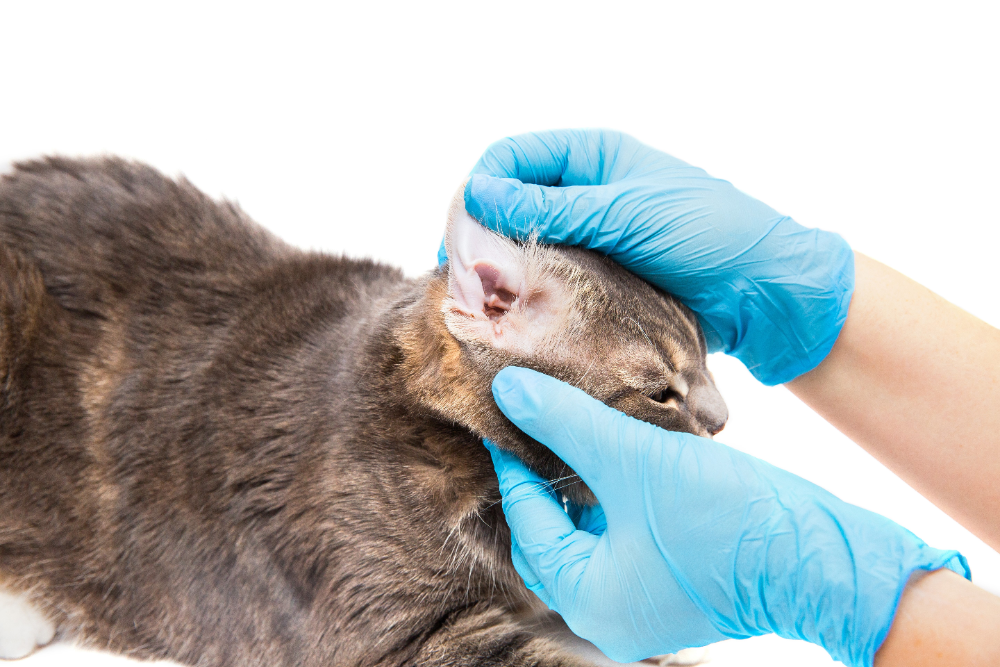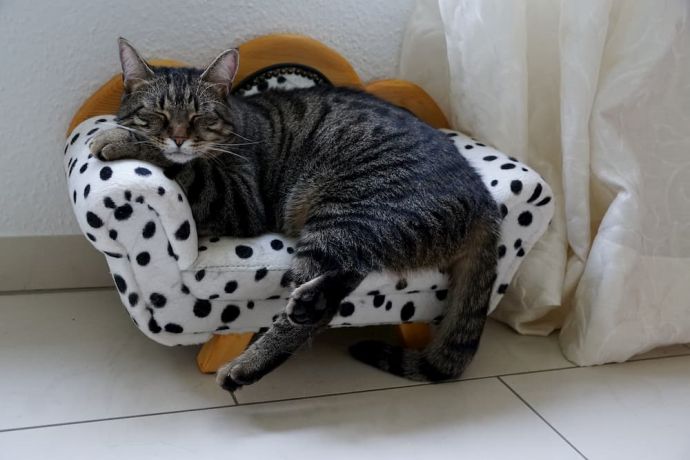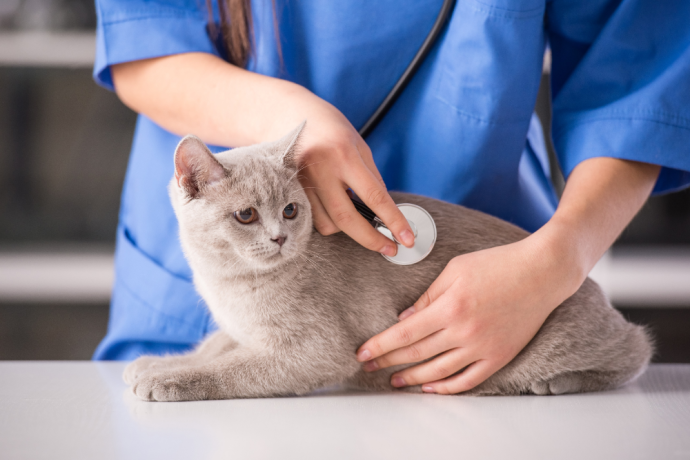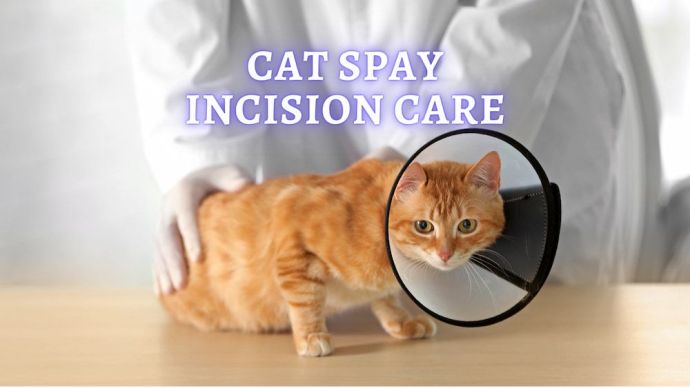Why is my Cat Scratching their Ears? (Veterinary Advice)
Written by:
Author: Dr. Kathryn Dench
Dr. Kathryn Dench is an experience veterinary with over 10 years' experience in small animal and exotic pet medicine. Kate qualified from Cambridge University Veterinary School in 2007. Kate has worked in a number of veterinary practices in the UK. She has extensive experience in the medical care of pet species, from dogs and cats to chickens and chameleons! In free time, Kate writes pet advice in order to ensure that owners are receiving the best possible information on how to care for their pets.
View all 9 articlesLearn about our editorial process and veterinary review board.
Viewed: 1297
Updated on: 03/16/2022
While the occasional scratch is normal for any cat, persistent scratching of the ears is likely to indicate an ear problem. Even if you don’t see your cat actively scratching, you may notice scratch marks behind your cat’s ears, or you may see your cat shaking their head repeatedly.
Causes My Cat keeps Scratching her Ear
This article explores the common causes of ear scratching in cats and what can be done to resolve them.
1. Fleas
The most common cause of any persistent scratching in household pets is fleas. In cats, this often presents as scratching around the neck and the ears. Adult fleas only go onto the animal to feed and spend most of their time in the environment. The absence of fleas on your pet doesn’t necessarily mean fleas aren’t the problem. Your vet may check your cat’s fur for ‘flea dirt’ or flea poop, which are tiny black granules that turn red in water, verifying whether your cat has come into contact with fleas recently.
It is recommended to keep your cat up to date with a good-quality, veterinary-recommended flea treatment to ensure they don’t get fleas and the resultant itching. However, even with complete flea control, cats can pick up the occasional flea bite when out and about, and for susceptible animals, even a single bit can itch intensely and cause persistent scratching.
2. Ear Mites
If fleas have been ruled out, the next most likely candidate is ear mites. These tiny white mites live in the cat’s ears and lay eggs in the ears, causing intense itchiness. Your vet will be able to check your cat for ear mites using an otoscope to look into the ears; in terrible cases, you can see the mites moving around the ear canal by looking through the magnifying glass of the otoscope. Treatment for ear mites often involves ear drops, but these only kill the adult mites and not the eggs, so your vet may recommend repeating the treatment again two weeks later when the next generation has hatched. Many flea control products now protect against ear mites, so if your cat is having repeated issues with ear mites, it may be worth using one of these products.
Ear mites do not like to live on people. People don’t usually get affected by their cat’s ear mites. The mites do transfer quickly between cats, so it is generally worth checking all cats in the household, even if only one shows symptoms.
READ MORE: Best Flea Treatment for Cats (Vet Review)
3. Foreign Bodies
A foreign body is a term used for something that has got stuck in the ear canal. In cats and dogs, the most common culprits are grass seeds. Usually, this causes sudden and intense scratching and shaking that is very distressing for your cat and requires an urgent trip to the vet. The vet will often be able to see the grass seed with an otoscope, but your cat may need sedation or an anesthetic for the foreign body to be removed.
READ MORE: Cat Emergency Kit
4. Ear Infections
Cats are prone to developing bacterial and yeast infections. The ear canal provides a warm, damp place where these microbes can thrive, and the resulting condition can be excruciating for our feline friends.
If you suspect your cat has an ear infection, either because they are scratching at the ear or because you notice a foul smell or even pus inside the ear, it is essential to quickly take them to a vet for an examination and prompt treatment. If your cat has had a previous ear infection and you still have some ear drops left over, don’t be tempted to start treatment without consulting with your veterinarian: if the condition has burst your cat’s eardrum, the medication will move into the middle ear, and some antibiotics can cause permanent damage and deafness. Your vet will check your cat’s ear with an otoscope to ascertain the extent of the infection and the condition of the eardrum before deciding on a course of treatment, which may include ear drops, oral antibiotics, or an antibiotic injection.
Before deciding on a course of treatment, your vet may want to take a swab of the contents of your cat’s ear to better define which microbes are involved and make sure the medicine they prescribe is the most effective for your cat’s particular infection. This is particularly important in severe, recurrent, or persistent ear infections, and in some cases, a sample may be sent away to a laboratory to check which antibiotics will be most effective.
Ear infections caused by bacteria and yeasts don’t spread to infect other pets or household members, but an infection can transfer from one ear to the other, either during the cat’s own grooming process or when we as owners are cleaning the ears. It is good to remember to use a new tissue or piece of cotton wool when cleaning each ear to avoid any transfer of microbes.
4. Allergies
Pets who suffer from allergies that result in skin inflammation are particularly prone to ear problems. The skin inside the ear canal is just as prone to irritation as any other skin, and with the conditions of the ear canal providing a perfect home for bacteria as described above, if the skin is in any way inflamed or irritated, an ear infection can develop. Allergies that present with skin symptoms can come from various sources; other than being particularly sensitive to flea bites, food allergies, or even allergies to things your cat comes into contact with the environment, like pollens can cause skin irritation.
READ MORE: Does my Cat have Allergies
If your cat’s ear problems are recurrent, or if they are accompanied by symptoms on the skin on other parts of their body, your vet may want to investigate for allergies. Some allergies can be diagnosed by a blood test or a skin test, while others, such as food allergies, are usually diagnosed by exclusion, meaning we change the cat’s diet to something completely different and improbable to cause allergies and see if the symptoms improve. Determining the cause of your cat’s allergies can be a frustrating process, but when a pet is badly affected by its allergies, it is helpful to know what to avoid. You can learn more about allergies in cats on the Blue Cross website.[1]
5. Routine Ear Care
As with many medical conditions, prevention is better than cure, and there are several steps we can take as cat owners to help maintain the health of their ears.
Routine flea treatment
As discussed above, fleas and ear mites are prevalent causes of ear scratching in cats; making sure your cat is up to date with a good quality flea control that is also effective against ear mites is an excellent step in protecting them from ear problems.
Checking and cleaning ears
It is rare to find a cat who enjoys having its ears cleaned, but many will tolerate routine ear cleaning at home if done carefully. Your veterinary clinic will be able to supply you with an ear cleaning fluid, which is more effective at cleaning ear wax than water and will be able to demonstrate good ear cleaning techniques to you, or you can check the AVMA YouTube channel for a demonstration.[2]
To make the experience as comfortable as possible for your cat, make sure the cleaner is at room temperature or even body temperature by putting it in your pocket for a few minutes before starting the ear cleaning process. Remember not to use the same cotton wool or tissue for both ears, and never poke anything into the ear canal as it is likely to cause irritation if not damage to your cat’s ear. Ear cleaning should not be needed more than once a month in an otherwise healthy cat. If your cat gets very stressed by ear cleaning, it is not a good idea to force the issue; instead, focus on checking your cat’s ears regularly and getting them used to have their ears handled so that they will be more comfortable with this if they ever need to be checked by the vet.
READ MORE: Best Flea Medication for Cats
Fast response
One of the best things we can do for our cats’ ear health is to be aware of any changes and get them checked by a vet as quickly as possible. Treatment of ear infections that have only just started to take hold is much easier than infections that have been rumbling along unnoticed for several weeks. Many veterinary clinics are open late in the evenings and on Saturdays so that owners can balance their pet’s health needs around work, so we have no excuse to put off that vet visit when it is needed!
Article Sources:
- “Cat Skincare and Earcare | Problems with Cat Skin and Ears | Blue Cross.” Blue Cross, bluecross.org.uk/pet-advice/skin-and-ear-care-cats.
- “Ear Care for Cats.” American Veterinary Medical Association, 26 Feb. 2014, youtube.com/watch.
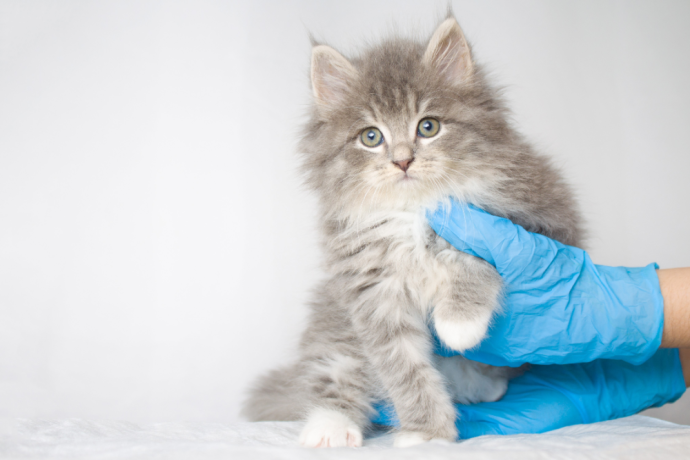 Cat Veterinary Tips Dehydration in Cats: Causes, Signs, Symptoms, and Treatment
Cat Veterinary Tips Dehydration in Cats: Causes, Signs, Symptoms, and Treatment - 393
- 0
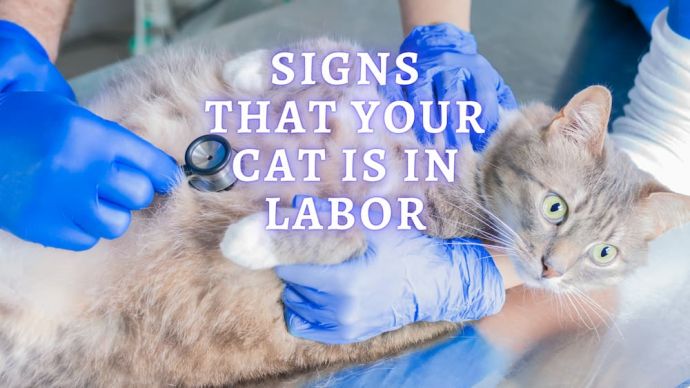 Cat Veterinary Tips Signs That Your Cat is in Labor: How to tell if a Cat is Pregnant?
Cat Veterinary Tips Signs That Your Cat is in Labor: How to tell if a Cat is Pregnant? - 14577
- 1
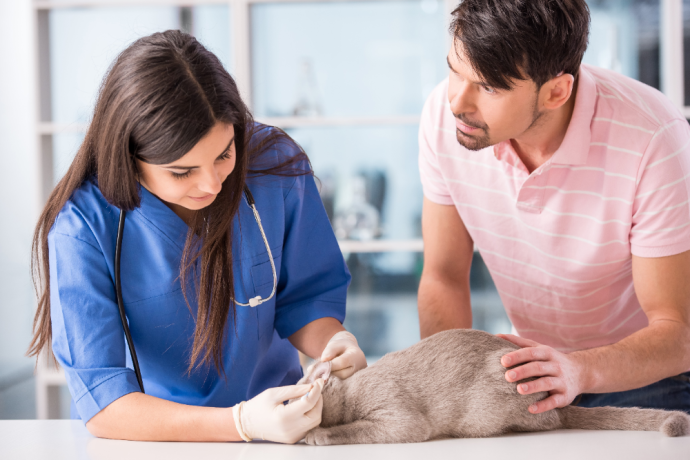 Cat Veterinary Tips Cat Fleas and Ticks: How to get rid of Fleas on Cats? (Vet Advice)
Cat Veterinary Tips Cat Fleas and Ticks: How to get rid of Fleas on Cats? (Vet Advice) - 175
- 0
 Cat Care Why Does My Cat Attack My Legs? 10 Reasons Why and What To Do About It (Vet-Approved Advice)
Cat Care Why Does My Cat Attack My Legs? 10 Reasons Why and What To Do About It (Vet-Approved Advice) - 45879
- 21
 Cat Veterinary Tips Cat Stomach Gurgling: Vet Advice on Why is Your Cat Stomach Gurgling?
Cat Veterinary Tips Cat Stomach Gurgling: Vet Advice on Why is Your Cat Stomach Gurgling? - 36204
- 4
 Cat Veterinary Tips My Cat Lost its Voice: Can Cats get Laryngitis? (Vet Advice)
Cat Veterinary Tips My Cat Lost its Voice: Can Cats get Laryngitis? (Vet Advice) - 23498
- 13











